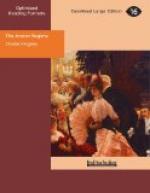But the old Ancien Regime would have shuddered, did shudder, at such a notion. The supreme class was to keep itself pure, and avoid all taint of darker blood, shutting its eyes to the fact that some of its most famous heroes had been born of such left-handed marriages as that of Robert of Normandy with the tanner’s daughter of Falaise. “Some are so curious in this behalf,” says quaint old Burton, writing about 1650, “as these old Romans, our modern Venetians, Dutch, and French, that if two parties dearly love, the one noble, the other ignoble, they may not, by their laws, match, though equal otherwise in years, fortunes, education, and all good affection. In Germany, except they can prove their gentility by three descents, they scorn to match with them. A nobleman must marry a noblewoman; a baron, a baron’s daughter; a knight, a knight’s. As slaters sort their slates, do they degrees and families.”
And doubtless this theory—like all which have held their ground for many centuries—at first represented a fact. These castes were, at first, actually superior to the peoples over whom they ruled. I cannot, as long as my eyes are open, yield to the modern theory of the equality—indeed of the non-existence—of races. Holding, as I do, the primaeval unity of the human race, I see in that race the same inclination to sport into fresh varieties, the same competition of species between those varieties, which Mr. Darwin has pointed out among plants and mere animals. A distinguished man arises; from him a distinguished family; from it a distinguished tribe, stronger, cunninger than those around. It asserts its supremacy over its neighbours at first exactly as a plant or animal would do, by destroying, and, where possible, eating them; next, having grown more prudent, by enslaving them; next, having gained a little morality in addition to its prudence, by civilising them, raising them more or less toward its own standard. And thus, in every land, civilisation and national life has arisen out of the patriarchal state; and the Eastern scheik, with his wives, free and slave, and his hundreds of fighting men born in his house, is the type of all primaeval rulers. He is the best man of his horde—in every sense of the word best; and whether he have a right to rule them or not, they consider that he has, and are the better men for his guidance.




